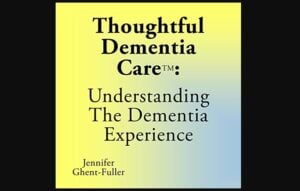ANN ARBOR, Mich. — Doctors write millions of prescriptions a year for drugs to calm the behavior of people with Alzheimer’s disease and other types of dementia. But non-drug approaches actually work better, and carry far fewer risks, experts concluded.
In fact, non-drug approaches should be the first choice for treating dementia patients’ common symptoms such as irritability, agitation, depression, anxiety, sleep problems, aggression, apathy and delusions, say the researchers in a paper published by the British Medical Journal.
The best evidence among non-drug approaches is for those that focus on training caregivers — whether they are spouses, adult children or staff in nursing homes and assisted living facilities — to make behavioral and environmental interventions.
The researchers, from the University of Michigan Medical School and Johns Hopkins University, reviewed two decades’ worth of research to reach their conclusions about drugs like antipsychotics and antidepressants, and non-drug approaches that help caregivers address behavioral issues in dementia patients.

The new DICE model – for
Describe, Investigate, Evaluate, and Create –
seeks to reduce psychotropic medication use in dementia patients.
They lay out their findings along with a framework that doctors and caregivers can use to make the most of what’s already known. Called DICE for Describe, Investigate, Evaluate, and Create, the framework tailors approaches to each person with dementia, and as symptoms change.
“The evidence for non-pharmaceutical approaches to the behavior problems often seen in dementia is better than the evidence for antipsychotics, and far better than for other classes of medication,” says first author Helen C. Kales, M.D., head of the U-M Program for Positive Aging at the University of Michigan Health System and investigator at the VA Center for Clinical Management Research . “The issue and the challenge is that our health care system has not incentivized training in alternatives to drug use, and there is little to no reimbursement for caregiver-based methods.”
Coincidentally, a U.S. Government Accountability Office report published the same day as the BMJ paper addressed the issue of overuse of antipsychotic medication for the behavior problems often seen in dementia. It found that one-third of older adults with dementia who had long-term nursing home stays in 2012 were prescribed an antipsychotic medication — and that about 14 percent of those outside nursing homes were prescribed an antipsychotic that same year.
The GAO calls on the federal government to work to reduce use of these drugs further than it’s already doing, by addressing use in dementia patients outside nursing homes.

Kales, however, cautions that penalizing doctors for prescribing antipsychotic drugs to these patients could backfire, if caregiver-based non-drug approaches aren’t encouraged.
She and her colleagues from Johns Hopkins, Laura N. Gitlin PhD and Constantine Lyketsos MD, noted in their paper that “there needs to be a shift of resources from paying for psychoactive drugs and emergency room and hospital stays to adopting a more proactive approach.”
But they also write, “drugs still have their place, especially for the management of acute situations where the safety of the person with dementia or family caregiver may be at risk.” For instance, antidepressants make sense for dementia patients with severe depression, and antipsychotic drugs should be used when patients have psychosis or aggression that could lead them to harm themselves or others. But these uses should be closely monitored and ended as soon as possible,
The authors lay out five non-pharmacologic categories to start with based on their review of the medical evidence. These 5 approaches have been shown to help reduce behavior issues:
- Providing education for the caregiver
- Enhancing effective communication between the caregiver and the person with dementia
- Creating meaningful activities for the person with dementia
- Simplifying tasks and establishing structured routines
- Ensuring safety and simplifying and enhancing the environment around the patient, whether in the home or the nursing/assisted living setting
They also note that many “hidden” medical issues in dementia patients – such as urinary tract infection and other infections, constipation, dehydration and pain – can lead to behavioral issues, as can drug interactions. So physicians should look to assess and address these wherever possible.
Kales, Gitlin and Lyketsos were working with the U-M Center for Health Communications Research to launch a National Institute of Nursing Research-sponsored clinical trial to test the DICE approach through a computer based tool for caregivers called the WeCareAdvisor. The tool will help families identify tips and resources in a single computer interface to address behavioral symptoms. The tips are designed to prevent or mitigate possible triggers for common behavioral symptoms such as pacing, repetitive questioning, restlessness, or shadowing.
“Behavior-based strategies may take longer than prescriptions. But if you teach people the principles behind DICE, the approach becomes more natural and part of one’s routine. It can be very empowering for caregivers or nursing home staff.” — Helen Kales, M.D.
For instance, Kayle says, caregivers could help greatly to reduce behavioral symptoms by:
- de-cluttering the environment,
- using music or simple activities that help to engage a person with dementia ,
- using a calm voice instead of being confrontational.
And making sure that caregivers get breaks from their responsibilities and take care of themselves, especially in the home, can help them avoid burnout and taking their frustration out on patients.
“Behavior-based strategies may take longer than prescriptions,” acknowledges Kales, a member of the U-M Institute for Healthcare Policy and Innovation. “But if you teach people the principles behind DICE, the approach becomes more natural and part of one’s routine. It can be very empowering for caregivers or nursing home staff.”
More research on both new drug options and the best ways to assess and address behavioral symptoms is needed, the authors conclude. But in the meantime, the evidence to date comes down in favor of non-drug approaches in most cases.

The components of the DICE approach are:
- D: Describe – Asking the caregiver, and the person with dementia if possible, to describe the “who, what, when and where” of situations where problem behaviors occur and the physical and social context for them. Caregivers could take notes about the situations that led to behavior issues, to share with health professionals during visits.
- I: Investigate – Having the health provider look into all the aspects of the person’s health, dementia symptoms, current medications and sleep habits, that might be combining with physical, social and caregiver-related factors to produce the behavior.
- C: Create – Working together, the patient’s caregiver and health providers develop a plan to prevent and respond to behavioral issues in the person with dementia, including everything from enhancing the patient’s activities and environment, to educating and supporting the caregiver.
- E: Evaluate – Giving the provider responsibility for assessing how well the plan is being followed and how it’s working, or what might need to be changed.












Therapeutic Touch is also QUITE EFFECTIVE!!!!
I understand your issues Unknown. I have an adult daughter, now age 43 with Down syndrome as well as Alzheimer's and her behavioral ruts are very difficult to bring her out of once she becomes lost in OCD issues and sundowner's. I have been trained and nothing is working at this point to redirect her when she decides she is seeing hallucinations or remembering having them at other times. She perseverates so badly now that it seems medication may be our only hope of keeping her somewhat engaged and slipping off into sitting for hours, eyes shut and body pulled up into protective mode to avoid what ever she believes she is or has been seeing. It's overwhelming
I take care of my mom. I'm a trained geriatric psychiatric nurse. I tried utilizing everything this article says to do (and more). It did not help my mom's depression and suicidal thoughts. Once she was on anti-depressant meds, though, she improved. Yes, behavior therapy should be included as part of a dementia patient's treatment, but to say 'say no to anti-psych drugs' is irresponsible and in many instances, can be dangerous to caregivers and patients alike.
My mom who has Alzheimer's is being treated with Seroquel and it has made all the difference in the world. We started on the lowest dosage, once a day until we reached the right dosage for her. When we tried to take her off of it, she became aggressive and combative.
I'm glad but the drug company says not to give this to people with dementia, high risk of stroke. They gave it to my dad INSTEAD of pain medicine…he was way out of his mind with it and so afraid, incoherant. I made them take him off and give him pain meds for his broken leg and he improved immediately. They just wanted to dope him up and did not consider his needs.
I'm curious about how many Lewy Body patients you used this with. Lewy goes faster, involves psychosis as a rule, includes Rapid Eye Movement Sleep Disorder that can endanger a caregiver, and has agitation far worse than other dementias – and they are all bad. I think this is great for early stage disease, but in later stages not so much. And not explaining that this might work but might not will split families who fuel over the care of dementia patients. New ideas are great. Within reason.
Lewy body is one that these drugs often don't work on at all or make worse if you have done your studies. You can't always stop hallucinations but you can comfort, acknowledge and not argue. Just tell them you told the dog to get off the bed….is so much better than trying to drug the hallucination away. So often what they need is someone to hold their hand and talk a little. Nurses sadly aren't paid to do this. It would be nice if there were more volunteers to see these folks.
Everyone's situation is different. I have noticed that high functioning individuals who had very busy lives, entrepreneurial type people, seem even more agitated when in advanced stages of AD. Drugs are needed to offset their agitation or they will suffer despite the best caregiving.